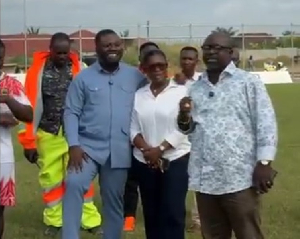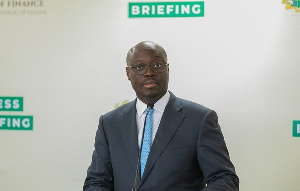By Samuel Hinneh
The fisheries sector plays a crucial role to Ghana’s economic development in relation to employment, food security and poverty reduction. Fish is the country’s most important non-traditional export commodity and the fisheries sub-sector accounts for about 5 percent of the agricultural GDP. Export earnings from fish and fishery products on average account for approximately 60 million US Dollars annually. But the backbone to local fish production comes from the marine sub-sector, which delivers more than 80% of the country’s total supply.
In spite of this, the marine sub-sector encounters immense problems resulting in massive decline in marine stock. The small pelagic resources, comprising sardinella, anchovies and mackerel, directly employing about 135,000 fishers in the marine sub-sector continuously face challenges including increase in canoes under open access while there have been a massive reduction in landings of these species.
The Sustainable Fisheries Management Project (SFMP) by the United States Agency for International Development (USAID/Ghana) which seeks to rebuild marine fisheries stocks and catches through the adoption of responsible fishing practices expresses concern about this trend which could lead to collapse of the resources and fisheries sector.
The five year USAID’s SFMP is implementing the project with local partners such as Development Action Association (DAA), Central and Western Region Fishmongers Improvement Association (CEWEFIA), Hen Mpoano, Friends of the Nation (FoN), among others to ensure optimal service delivery to people at the local level.
For instance landings of most important species of the small pelagic resources have been decreasing sharply since 2007 and have reached in 2014 about 15% of the maximum landings realised in 1996. The Scientific and Technical Group (STWG) of the USAID’s project report reveals that small pelagic resources are severely overfished while overfishing continues to occur in the country. The STWG, which provides information on status of stocks to inform decision-making, says that the current fishing pressure on small pelagic fish stocks was estimated at 0.74, well above the acceptable level of fishing pressure estimated at 0.4. The situation is caused by excess fishing effort by the number of boats and fishing trips, stated the STWG. Open access allowed fishing pressure to increase, resulting in the decline of fisheries stock. The current total biomass, which looks at weight of fish in the ocean of small pelagic is estimated to be the lowest in more than 30 years, according to the STWG.
The Ministry of Fisheries and Aquaculture Development and the Fisheries Commission have developed a Fisheries Management Plan in accordance with the Fisheries Act of 2002 in consultation with stakeholders in order to address issues facing the marine fisheries sector. The plan seeks to rebuild fish stocks to enhance the socio-economic conditions of fishing communities, create employment, improve food security to contribute to the country’s gross domestic product and foreign exchange as well as to meet international standards and frameworks.
A policy dialogue was therefore organised by the DAA for women fish processors from Greater Accra, Western and Central regions at Apam, in the Central region to educate the women on the Fisheries Management Plan.
Mr Thomas K Insaidoo, Deputy Director in charge of projects at the Fisheries Commission, says the decline in fish production has got serious economic effects for the country and could lead to fish deficit. That can results in Ghana importing a huge chunk of fish to meet demand, which is not a sustainable practice, he explained.
“That is why the government of Ghana is concerned about the fish situation. In Ghana, if you visit any cold stores a lot of them are filled with chicken that have been killed and stored for ten years, which is what we are eating. And all this is the source of the medical problem confronting most Ghanaians so it is important that we protect our fisheries so that we can get fish from our own waters,’’ he stated.
According to him, the fisheries act was created to prevent unapproved practices in the fisheries sector, but adherence to the provisions in the act has become a problem.
He added that bold steps are needed to prevent further unapproved practices in the fisheries sector.
“One of the steps which others have taken is that, at a point in time, we will close the sea by making sure that fishermen don’t go to sea for a certain period and believe that, that period will have the opportunity for the fishes to reproduce and replenish the stock.
“In fact we can even close an area for fishing, or we can decide that areas will be demarcated as marine reserves or parks so that those areas will be no-go areas and we expect that the fish will breed enough to populate the other parts of the sea. This is part of the management tools we want to apply now. The ones that we have been applying is not working and we have reached a time when we have to do additional management plan,” Mr Insaidoo said.
“The close season has not started yet, but we will start with the trawlers in November. The players have agreed and in fact the minister has written that the sea will be closed in November for one month. Early next year, the sea will also be closed for two months and of course we are all going to monitor if it works,” he emphasised.
Mr Insaidoo said the closed season is not the only solution to protect the sea, adding, “If we close the sea and people are still using dynamite, detergent, etc in fishing it will not help us. If you close the sea and replenishment takes place, then immediately people are still using same unapproved materials in fishing then we are back to square one or done nothing.”
He appealed to fishermen to desist from unhealthy fishing practices, stating that, enforcement of the law by the military and navy is good but it is difficult to sustain it given the high cost associated with sending a naval vessel to the sea.
“So voluntary compliance is what we are sensitising them on and if it fails then we will apply the force which we have been doing anyway,” he noted.
The Executive Director of the DAA, Lydia Sasu says the partners working on the SFMP project are working with people engaged in fishing activities to replenish the sea. Years past, the sea had abundant fishes but due to the usage of dynamite, DDT, have led to a rush for the limited stock in the sea accounting for the decline, she explained.
According to her statistics shows that in 2008, fishermen had lots of catch from the sea, subsequently there has been a decline in the fisheries stock, noting that, best practices from many countries show that closed season can replenish the sea.
Traditionally, fishing was not allowed on Tuesdays, but government intends to place two days ban on fishing beginning next year so that the fishes can procreate and replenish fisheries stock, says Sasu.
“It is good news and once that is done it can help to rebuild the fisheries stock. Other countries have demarcated places to promote marine reserves for six months before fishing activities take place. In Ghana that practice is low. That can help to provide fish processors mostly women with some revenue. Due to poverty, many along the coasts are engaging in child labour and trafficking which is detrimental to children’s development and national development,” Sasu emphasised.
“Fish processing along the coast needs to be done in healthy environment and manner to promote heathy wellbeing, so we have taken the women through series of training aimed at sensitising them on proper fish processing,” she added.
Sasu says the event seeks to sensitise people on the fisheries law and management plan on policies that have been put in place by the government to safeguard the fisheries sector.
The Apamanhen of Apam in the Central region, Obotantam Edu-Effrim X says to ensure sustainable fishing activities continue, the fisheries law must be enforced.
“Most of the time, the leaders who make the laws disobey the laws which does not support sustainable fishing. The beaches in the country are very filthy due to improper disposal of plastics, in addition, pair trawling as a practice kills the fishing industry, and dynamite usage. All these must be stopped to ensure the fisheries stock becomes adequate,” he says.
He called on fishermen to report cases of dynamite usage to marine police along the coast.
Grace Ahor, fish processor from Elimina, also called for total enforcement of the ban on the usage of dynamite in the fisheries sector before it completely destroys the sector.
She also urged stakeholders operating in the sector to engage in practices that would keep beaches in the country free from plastics and other unhealthy acts.
Grace Ampah, another fish processor from Apam, called on the government to eradicate saiko, a practice where fish collectors use modified boats, go to sea without nets to collect or buy fish (mostly juvenile fish) from trawl vessels.
Florence Arthur, a fish processors from Mimford, said laws are passed by leaders without consulting people at the local but there is always intense pressure on the local people in the implementation of the law.
She stated that some of the women fish processors are not even aware of the law and therefore called for intensification of awareness creation among women fish processors.
The Director of Hen Mpoano, Kofi Agbogah, one of the local partners of the USAID’s SFMP told the women that the Fisheries Management Plan seeks to create a sustainable environment in the fisheries sector.
Opinions of Sunday, 31 July 2016
Columnist: Hinneh, Samuel














